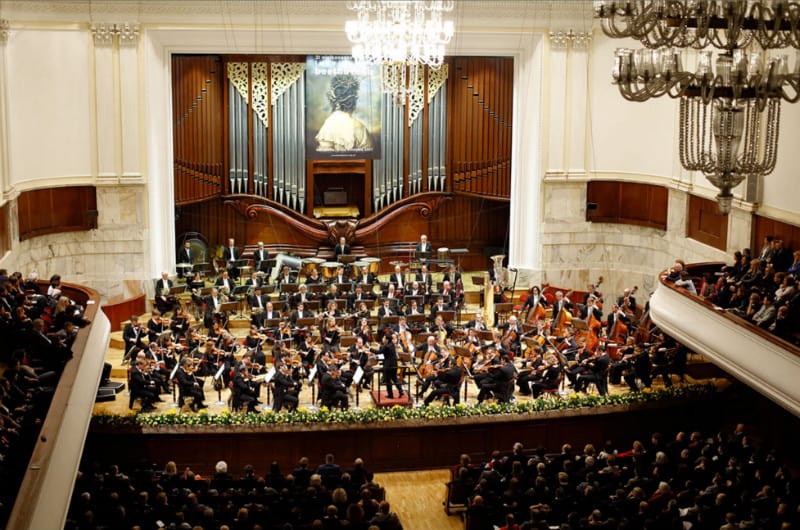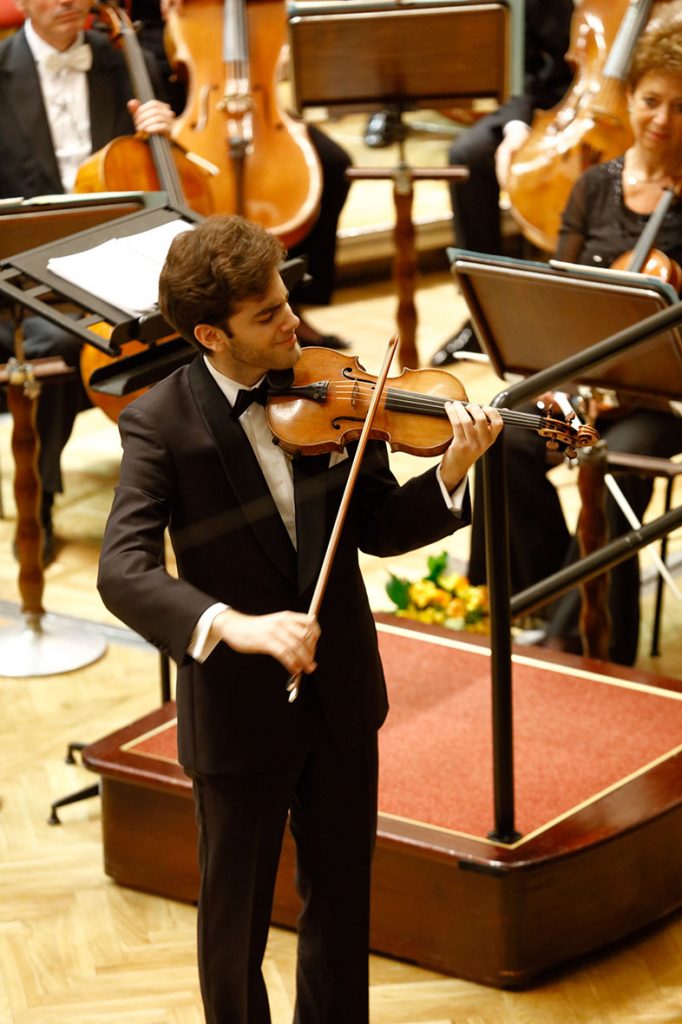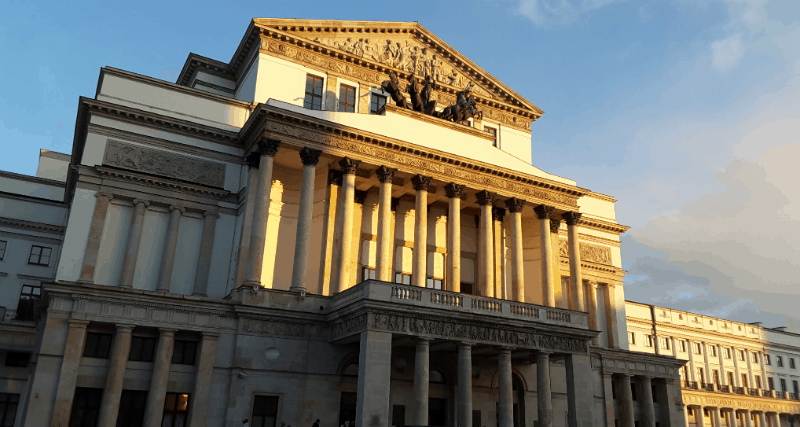What is your dream travel destination? Rome? Paris? Bruges? L.A? How about Warsaw, Poland… It is now my favorite city in the world. I had the chance to discover Warsaw last week during the Beethoven Easter Festival. It is a festival organized by the Ludwig van Beethoven Association. The Association in turn is run by the amazing Elizabeta Penderecka, wife of Poland’s legendary composer Krysztof Penderecki, and a patron of classical music in her own right. She is the guardian of young talents of all nationalities, a champion of Polish artists, and as far as we can tell from the festival, an amazing organizer. I was to learn from her that the Association runs only with a staff of nine, which made such a big event all the more impressive.

The Beethoven Easter Festival runs every year, around Easter time. It was started in 1997, on the 170th anniversary of Beethoven’s passing, in the city of Krakow. It was through the initiative of this festival that Beethoven’s manuscripts were opened for public viewing in an exhibition for the first time. Score sheets of music , hand-written by Beethoven himself, that you had the opportunity to see during the day. Then, in the evening, attend the festival concerts to witness the music live. How amazing is this? Later on, in 2004, the festival moved on to the capital city of Poland to be able to expand in scope. However, parallel activities still continue to be run in Krakow, as well as other cities. And the exhibition of the manuscripts has become a continual tradition, repeated every year. This year, the Beethoven Easter Festival ran through April 2nd and 14th. I had the privilege of being able to witness more than a week of this. I left Warsaw with many cherished musical memories, as well as impressions from a city that I think should be in everyone’s travel bucket list. Here are some of my ponderings:
The festival draws attention through several aspects. Firstly, in the selection of compositions and in the artists and composers featured, it creates a fine balance of the globally renowned with hidden gems waiting to be discovered. This also includes bringing to light yet undiscovered pieces of great names. Beethoven and Puccini are there with their renowned Kreutzer and Manon Lescaut. Bizet is there as well, but not with Carmen. Instead, we re-discover Bizet with his little known one-act comic opera, Djamileh. Have you heard of it? I had never heard of it till the evening I got to watch it live at the Warsaw Philharmonic Concert Hall in Warsaw.
Alongside the historical, big names, the festival also features composers of less renown, but of much worth. This is particularly true for Polish composers, cherished at home and within the classical music inner circle, but missing widespread global attention. Poland’s 20th century composer Andrzej Panufnik is an example. I have yet to come across a composition of his in the programs of concert halls in my city of Istanbul. Yet, he is an artist to note. His Violin Concerto was a work commissioned by Sir Yehudi Menuhin himself. Even Queen Elizabeth II acknowledged his artistry by conferring a knighthood upon him in 1991. I hope to start seeing his name more often in programs all over the world. Another such Polish composer featured was Nowowieski. A student of Max Bruck (and for a few lessons, also of Dvorak!) and a 20th century composer of his own right, Nowowieski was featured amply in the Beethoven Festival. Here is to seeing his name transcend to concert halls all over the world.
The artists featured in the Beethoven Festival have also been carefully selected. There are big, global names. This year, on April 5th, Oscar-winning American artist John Malkovich took stage as narrator alongside the Deutche Radio Philharmonie performing selections by Beethoven. Violin superstar Anne Sofie-Mutter is said to be taking stage in next year’s program in March 2018. Poland’s gift to the world, legendary composer Krystof Penderecki is there in the program, and present in person too at times. Renowned composer Michael Jurowski was there, conducting Beethoven with the Polish Sinfonia Youth Orchestra. A septuagenarian now, Jurowski is a leading figure in the classical music world, and has a biography to impress: He grew up among the inner circle of such colossal Russian names as Rostropovich, Khachaturian, and Shostakovich, has been and continues to be music director and chief conductor of many opera and orchestras renowned. He has even been nominated for a Grammy.
Alongside such names, you will also find young talents to whom Mrs. Elzbieta Penderecka acts as a guardian angel of sorts. These are young artists in their early twenties who have recently stepped into the professional world and who await international recognition and acclaim. The Beethoven Easter Festival does just that. Two performances in particular drew my attention in this regard: The duet performance of pianist Aleksandra Swigut and violinist Veriko Tchumburidze at the Royal Castle with a program of Beethoven’s Kreutzer, Bloch’s Suite for Solo Violin, and the young violinist Emmanuel Tjeknavorian who performed Mendelssohn’s Violin Concerto in E minor with the Frankfurt Radio Symphony Orchestra at the Warsaw Philharmonic Concert Hall.

Veriko had drawn attention just weeks ago winning the prestigious Wieniawski Competition, with Maxim Vengerov as head of jury and Krysztof Penderecki as the honorary chair. Swigut is a doctoral student of the piano, with prizes in international competitions in New Orleans, Ettingen, and more. They took stage Royal Castle, in the only chamber program of the festival. Tjeknavorian has been the recipient of the award for best interpretation of Jean Sibelius’ Violin Concerto, as well as Second Prize at the International Jean Sibelius Competition in 2015, and is a “Rising Star” of the European Concert Hall Organization. All young artists were emerging virtuoso of impressive talent, and the Festival enabled them to reach further recognition and an international audience.
In addition to the music and the artists, the Beethoven Easter Festival draws attention with the Polish performance halls and venues hosting the performances. The Warsaw Philharmonic Concert Hall is the main venue, hosting the great majority of performances. It is an early 20th century building of descent size, with a colossal organ adorning the backdrop of the stage. The acoustics are remarkable. Even delicate, soft notes from a solo violin can be heard with equal clarity and resonance from all corners and levels of the three-story building. Next comes the Royal Castle, hosting chamber music in a hall literally built for royalty. Less spacious, but more impressive in architecture, the Royal Castle has ornate, golden decoration, impressive chandeliers, and a majestic aura overall. Teatr Wielki Polish National Opera hosted the closing performance of the festival, and was the embodiment of the phrase “save the best for last.” This colossal building takes over several blocks in downtown Warsaw and should be on every classical music lover’s bucket list of performance halls to experience. It is known in English as the Grand Theater of Warsaw, and “grand’ is indeed the term to describe it.

Overall, the Beethoven Easter Festival is a massive celebration of music spanning across two weeks, bringing together a myriad of artists, orchestras, composer and compositions. It pays homage to Beethoven and the other great while also championing the contemporary and less renowned. It gives due respect to the Polish composers and artists deserving global popularity. And while hosting well-established and acclaimed artists, it also serves as a patron of newly emerging young stars awaiting discovery. And it does all this in venues, and a city, to remember.









